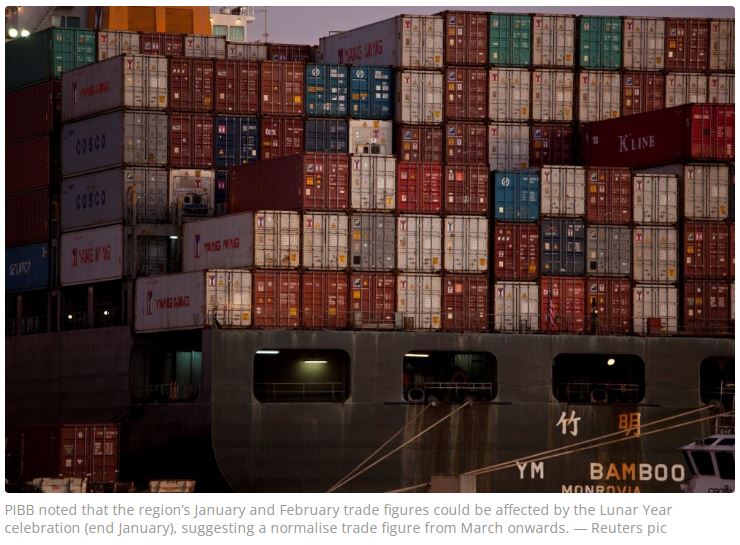Malaysia makes strong start of external trade, posting steady trade balance in Jan, says Public Investment Bank
KUALA LUMPUR, Feb 21 — Malaysia has made a strong start of its external trade, posting another steady trade balance in January, its sixth straight month of positive trade growth.
Public Investment Bank Bhd (PIBB), in a research note, said favourable trade condition pushed January’s surplus to jump 10.9 per cent year-on-year (yoy) to RM18.4 billion which could have been much higher if not for the stronger growth in imports.
It said Malaysia’s exports expanded for the 17th straight time for the month under review, thanks to full economic openings around the world, a favourable condition consistent with an improvement in global conditions.
January 2021 imports jumped 26.4 per cent yoy to RM92.3 billion, the third highest in the last 12 months, led by capital (+37.7 per cent), consumption (32.0 per cent), and consumption goods (28.3 per cent), signalled a rapid economic turnaround for the country.
“Trade surplus is expected to remain encouraging in the near term to be driven by full economic openings across Asean, China and advanced economies (AEs), steady global economic outlook, a lag impact of global expansionary strategies in 2021, and sustained rally in global commodities, especially oil and crude palm oil (CPO).
“This could be dampened, however, by an expected turnaround in imports following full economic openings in Asean and massive government relief measures that may underpin a rebound in consumption and capital goods imports,” it shared.
PIBB highlighted that Malaysia’s steady exports momentum was in-sync with regional trends which benefitted from full economic openings in Asean and AEs and elevated Covid-19 fiscal spending apart from the surge in global commodity prices, especially mining and agriculture.
The jump in Asean exports for January was led again by Indonesia (+25.3 per cent), four months in a row by the republic, followed by Malaysia (+23.5 per cent), Singapore (+17.6 per cent), and Vietnam (+1.6 per cent).
The research house said excluding Thailand and the Philippines, this marks four straight months of broad-based expansion for Asean, thanks to the region that has been recovering well from Covid-19.
However, it noted that the region’s January and February trade figures could be affected by the Lunar Year celebration (end January), suggesting a normalise trade figure from March onwards.
“Asean exports are expected to remain steady in the near term to be driven by favourable global outlook that will push demand for manufacturing and natural resources.
“This will be further lifted by steady mining momentum such as crude petroleum and natural gas, as well as agriculture such as CPO and natural rubber, thanks to the rally in unit prices, while demand for electrical and electronics (E&E) will also get a lift from global semiconductor upcycle, and hybrid arrangements for work and learning,” it said.
PIBB said however, Asean exports could be dampened by base disadvantage following its recovery last year.
It said Asean exports are still susceptible to the risks of Covid-19 resurgence that may lead to pockets of containment measures, a potential disruption in trade activities.
“Strict foreign labour policy, supply disruptions and international borders that may remain closed are seen as additional dampener to the full turnaround of Asean exports. Shortages in raw material such as chips that could lengthen firms’ delivery time remains one of the major concerns in 2022,” it added. — Bernama


 Thailand
Thailand




